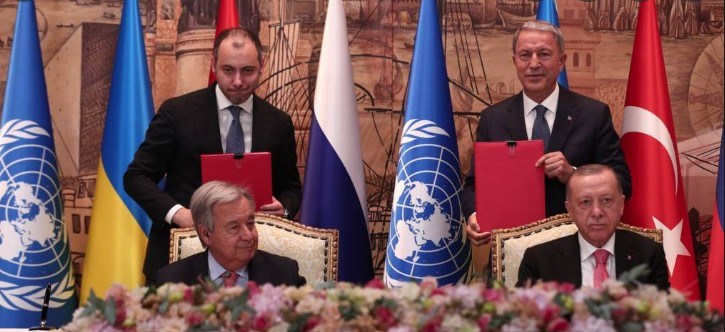Virendra Pandit
New Delhi: Amid their 149-day-old ongoing war, Russia and Ukraine on Friday signed a deal aimed at relieving a global food crisis caused by the blocked Black Sea grain deliveries, the media reported on Saturday.
The two countries, known as Europe’s Break Baskets, account for a quarter of global grain production, and several countries depend on them for food imports.
As their war, which Russia started by invading Ukraine on February 24, remained inconclusive, the landmark deal, signed in Istanbul (Turkey), ended months of negotiations. After the deal, the wheat prices tumbled to levels last seen before Russia’s invasion five months ago.
The first major deal, amid umpteen failed attempts for a ceasefire, is likely to help ease the “acute hunger” that the United Nations said faces an additional 47 million people because of the Russian-Ukrainian war.
The two warring countries’ hostility spilled over into the signing ceremony as well—delayed briefly by disputes about the display of flags around the table and Ukraine’s refusal to put its name on the same document as the Russians.
Eventually, they inked separate but identical agreements in the presence of UN Secretary-General Antonio Guterres and Turkish President Recep Tayyip Erdogan at Istanbul’s lavish Dolmabahce Palace.
“Today, there is a beacon on the Black Sea — a beacon of hope, a beacon of possibility, a beacon of relief,” Guterres said moments before the signing.
President Erdogan, a key player in the negotiations who has good relations with both Moscow and Kyiv, said the deal would “hopefully revive the path to peace.”
But the media reported Ukraine entered the ceremony by warning that it would conduct “an immediate military response” should Russia violate the agreement and attack its ships or stage an incursion into its ports.
Ukrainian President Volodymyr Zelensky later said the responsibility for enforcing the deal would fall to the UN, which, along with Turkey, is a co-guarantor of the agreement.
Russian warships and landmines have blocked huge quantities of wheat and other grain in Ukrainian ports.
Zelensky said around 20 million tonnes of produce from last year’s harvest and the current crop would be exported under the agreement, estimating the value of Ukraine’s grain stocks at around USD 10 billion.
After the signing ceremony, Russian Defence Minister Sergei Shoigu told Kremlin state media he expected the deal to work “in the next few days.” Diplomats expect grain only to start fully flowing by mid-August.
Russia had secured a separate pledge from Washington and Brussels to lift all restrictions on its own grain and other agricultural exports.
The United States and European countries hailed the agreement while urging Moscow to abide by its rules.
A US official said the deal was “well-structured” enough to monitor Russian compliance.
The European Union called for the deal’s “swift implementation” while British Foreign Secretary Liz Truss said London “will be watching to ensure Russia’s actions match its words.”
The four sides—Russia, Ukraine, Turkey, and the UN—must first set up a joint command-and-control center in Istanbul that monitors the ships’ passage and addresses disputes. They have yet to decide how the ships will be checked for weapons before returning empty to Ukrainian ports.
They signed the grain deal a day after Russia’s restart of the Nord Stream natural gas pipeline eased European concerns of a permanent shut-off after a 10-day maintenance suspension.
On Friday, the United States signed in another USD 270 million in military aid to Ukraine, including rocket systems, artillery ammunition, and armored command posts.
So, the war will go on.

